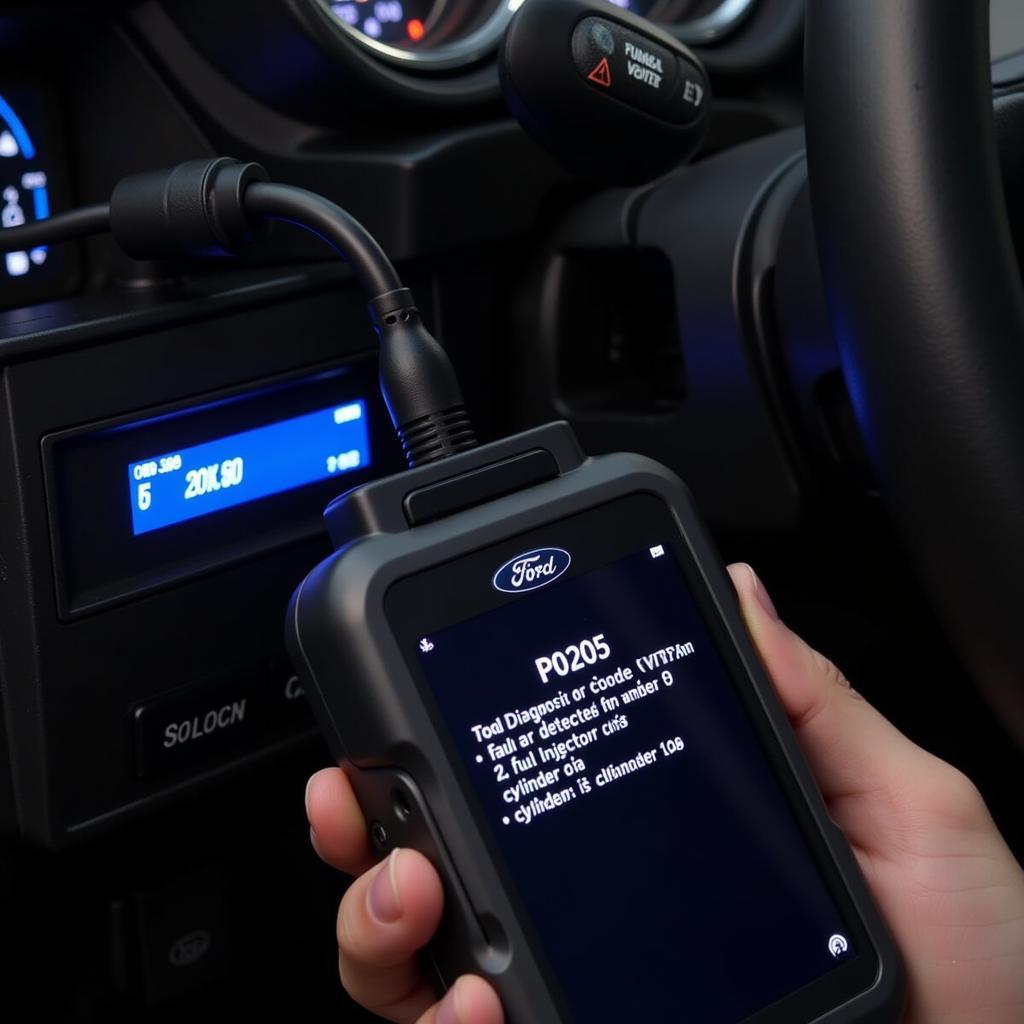Your cart is currently empty!

Ford OBD2 Code P0205: Symptoms, Causes, and How to Fix It
The check engine light glowing on your dashboard can be an unwelcome sight, often accompanied by a sense of dread about potential car troubles and costly repairs. For Ford owners, one specific code, P0205, frequently pops up, signaling a problem within the fuel injector circuit. This comprehensive guide delves into the intricacies of the Ford Obd2 Code P0205, covering its symptoms, common causes, diagnostic procedures, and potential solutions.
Understanding the OBD2 system and its role in modern vehicles is crucial for effectively troubleshooting and resolving issues like the P0205 code. OBD2, short for On-Board Diagnostics, acts as your car’s internal communication network, constantly monitoring various systems and components for optimal performance. When a problem arises, the OBD2 system generates specific diagnostic trouble codes (DTCs), such as P0205, which provide valuable clues for mechanics and car owners to pinpoint the root cause of the issue.
 Ford OBD2 Scanner Connected to a Car’s Port
Ford OBD2 Scanner Connected to a Car’s Port
What Does the Ford OBD2 Code P0205 Mean?
The code P0205 specifically points to a malfunction in the fuel injector circuit for cylinder number 5. This essentially means the engine control module (ECM), responsible for managing your engine’s vital functions, has detected an issue with the electrical circuit controlling the fuel injector for that specific cylinder.
Symptoms of Ford OBD2 Code P0205
Recognizing the common symptoms associated with the P0205 code can help you identify the problem early on and prevent potential damage to your Ford’s engine. Here are some telltale signs to watch out for:
- Illuminated Check Engine Light: The most obvious symptom is the check engine light illuminating on your dashboard.
- Engine Misfires: A malfunctioning fuel injector in cylinder 5 can disrupt the combustion process, leading to noticeable engine misfires and rough idling.
- Reduced Engine Performance: You may experience a decrease in your engine’s overall power and acceleration.
- Poor Fuel Economy: A faulty fuel injector can disrupt the air-fuel mixture, leading to increased fuel consumption.
- Rough Idle: The engine may vibrate excessively or shake when idling due to the misfire in cylinder 5.
- Engine Hesitation: Your Ford might hesitate or stumble when you accelerate, particularly under load.
Common Causes of Ford OBD2 Code P0205
Several factors can contribute to a P0205 code in Ford vehicles. Here are some of the most prevalent causes:
- Faulty Fuel Injector: The most common culprit is a malfunctioning fuel injector in cylinder 5. Over time, injectors can become clogged, damaged, or wear out, leading to electrical circuit issues.
- Wiring Problems: Damaged, corroded, or loose wiring within the fuel injector circuit can disrupt the electrical signals, triggering the P0205 code.
- Damaged Connector: The electrical connector for the fuel injector in cylinder 5 may be damaged or corroded, preventing a secure connection.
- Faulty ECM: In rare cases, a malfunctioning ECM could misinterpret signals or fail to provide the correct commands to the fuel injector, leading to the P0205 code.
Diagnosing the Ford OBD2 Code P0205
Accurately diagnosing the root cause of the P0205 code is essential for implementing the correct repair strategy.
 Mechanic Using a Multimeter to Diagnose P0205 Code
Mechanic Using a Multimeter to Diagnose P0205 Code
Here’s a step-by-step diagnostic approach:
- Read the Code: Start by connecting an OBD2 scanner to your Ford’s diagnostic port and retrieve the stored trouble codes. Confirm the presence of the P0205 code.
- Inspect the Fuel Injector: Visually inspect the fuel injector for cylinder 5 for any signs of damage, cracks, or leaks.
- Check the Wiring Harness: Examine the wiring harness connected to the fuel injector for any frayed wires, loose connections, or corrosion.
- Test the Fuel Injector Circuit: Utilize a multimeter to test the electrical continuity and resistance of the fuel injector circuit. This helps determine if the injector is receiving the proper signals from the ECM.
- Inspect the ECM: If the previous steps do not pinpoint the issue, the ECM itself may require inspection for potential faults. This step is typically best handled by a qualified mechanic.
How to Fix Ford OBD2 Code P0205
The repair method for the P0205 code will depend on the underlying cause identified during the diagnostic process. Here are some potential solutions:
- Replace the Fuel Injector: If the fuel injector for cylinder 5 is found to be faulty, replacing it is the most effective solution.
- Repair the Wiring Harness: Any damaged, corroded, or loose wiring within the fuel injector circuit should be repaired or replaced as needed.
- Replace the Connector: If the electrical connector for the fuel injector is damaged, replacing it can ensure a secure and proper connection.
- Reflash or Replace the ECM: In cases where the ECM is faulty, it may need to be reflashed with updated software or replaced entirely.
Ford OBD2 Code P0205: Frequently Asked Questions
Q: Can I still drive my Ford with the P0205 code?
A: While it might be possible to drive your Ford for a short distance with the P0205 code, it’s not recommended. Driving with a faulty fuel injector circuit can lead to further engine damage and potentially leave you stranded.
Q: How much does it cost to fix the P0205 code?
A: The repair cost can vary depending on the underlying cause and whether you choose to tackle the repair yourself or visit a mechanic. Fuel injector replacement costs vary but generally range from $150 to $400 per injector plus labor.
Q: Can bad gas cause the P0205 code?
A: While contaminated fuel can certainly cause other fuel system problems, it’s less likely to directly trigger the P0205 code, which specifically points to an electrical circuit issue.
Need More Help?
For personalized guidance and expert assistance in resolving your Ford OBD2 code P0205 or any other car diagnostic needs, don’t hesitate to reach out to our dedicated team. We’re available 24/7 to provide comprehensive support and solutions tailored to your specific vehicle and situation. Contact us via WhatsApp: +1(641)206-8880, Email: [email protected].

Leave a Reply